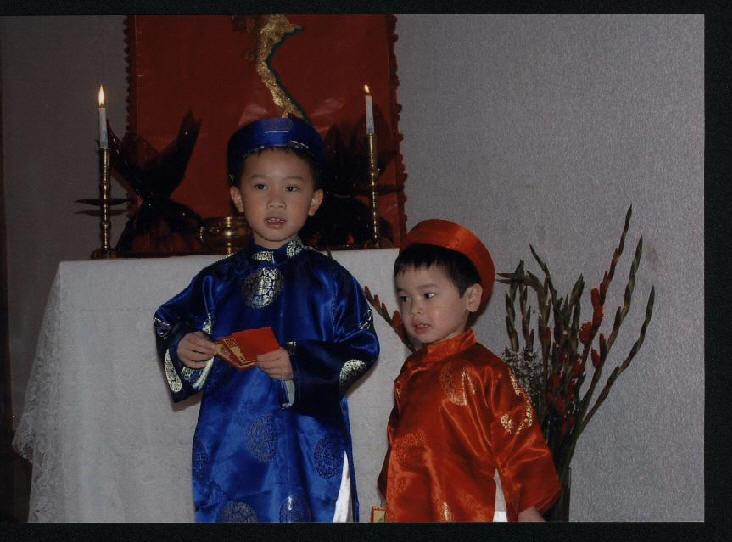 “We are
working everyday,
“We are
working everyday, LEVELS OF ANALYSIS
I think when Mylan and Vinh first left their home country, thoughts of returning or seeing their family again was not a reality. People do leave their homes, families, cultures, traditions and language in search of a better way of life. It is interesting to see find that their definition of a “better life” is simply basic human rights. We have seen the struggles they experienced upon leaving their country and their hardships of being in a foreign country. I couldn’t help but feel of her dedication, and her drive to succeed no matter what trial she encountered. The Vo’s are established here in the Valley, but help and support is still being generated towards home. They have a family to support and take care of, but a need or a want from a family member back home is met with no hesitation. Looking at migrant groups from any other country we see how this is universal. Family bonds do cross borders and transnational families are then created. Cathy Small, an anthropologist from Flagstaff in her book entitled Voyages, talks about a nation that is heavily dependant on remittances. Many leave their countries in hopes of improving their family’s current situations. We sometimes make the false assumption that people are looking for a new life. The truth is many love their countries of origin. They have a family just like ours, they enjoy their cultural and traditional practices. They just don’t have access to the basic necessities of life. As demonstrated by the OCW’s of the Philipines, they agree to leave everything and work under unfavorable conditions just so their family could have what they need. I thought about a quote in Chang’s Disposable Domestics that relate to the matter of working overseas.
 “We are
working everyday,
“We are
working everyday,
So our boys and girls can play.
We are working for our homes and country too.
We like to wash, to sew to cook,
We like to write, or read a book,
We are working, working, working every day.”
So we see how countries benefit from the bounties found in developed countries. But how do “we” the receiving countries benefit from migration. We turn again to the Vo’s and their establishment in Arizona. Their consumption of good and services in America far outweigh their contributions to their home country. They generate money for the US economy and let us not forget that they pay taxes as well. Beyond that they both have served those in the community. Mylan’s first five years were spent visiting those in nursing homes and teaching children the bible. Vinh was a youth group leader. They are law abiding citizens who sustain our government. Their children go to school, they go to work and have made wonderful contributions in the workplace. I don’t think we realize just how much we depend on cheap immigrant labor. Unlike Mylan and Vinh who have trained for their specific jobs, many immigrants take on jobs that most people don’t want. They are our gardeners, they clean the rooms of the hotels that we stay in during vacation. And like my father at one point, washed our dishes at the local restaurants. These people come to work and that’s just what they do. They work harder than many of us and for less pay. We are able to enjoy low prices because they have no choice but to work for less.
Mylan and Vinh both had positive experiences with America. For the most part their ideas of the United States were fulfilled. Perhaps they compare it to their country situation, and are able to see things from a different perspective. They are of course individuals, and it’s easier to react to an individual that to a whole community. Reflecting on the experiences of the Laotian’s in Storm Lake or the Hmong’s in Wisconsin. Vinh says it best in four words, “miscommunication leads to misunderstanding”. Of course with the language barrier there is bound to be miscommunication, but the only way to keep it from escalating into a misunderstanding is to listen. Take the time to interact with the new arrivals. Learn from them, teach them. Surely developing a relationship is a better route than trying to drive them out. You’ll be surprised at the things you gain from interacting with them. I’ve surely benefited from my interaction with Mylan and Vinh. They feed me every time I go over to their home and let me tell you that is some good stuff. But more than that I always feel a sense of comfort and welcome as I walk through their doors. They are real people. Like many immigrants, they are good.

McMurray was right, when he said that talk of migration takes on many forms. In this case Mylan and Vinh told of their journey in a biographical narrative. And like the people of Nador (in McMurray's, in and out of morocco), families and village members who were left behind at home keep up with the lives of those who migrated. Like Vinh’s brother, Can, village members at home hold him with high regards because he was the first to attend a University in the United States.
Migration is a wonderful thing. Whether we encounter them first hand or not, migration has an effect on our neighborhoods, our workplaces and on a global scale. In 2002 United Nations reported 175 million people residing outside of their country of birth. This number has doubled since 1975. Many people like Mylan and Vinh become faces that you see in your neighborhood, at the local grocery stores and every Sunday at church services. They come in search of opportunity. I strongly feel that opportunities should be given to all who seek it, and should not be withheld and limited to borders and parameters.